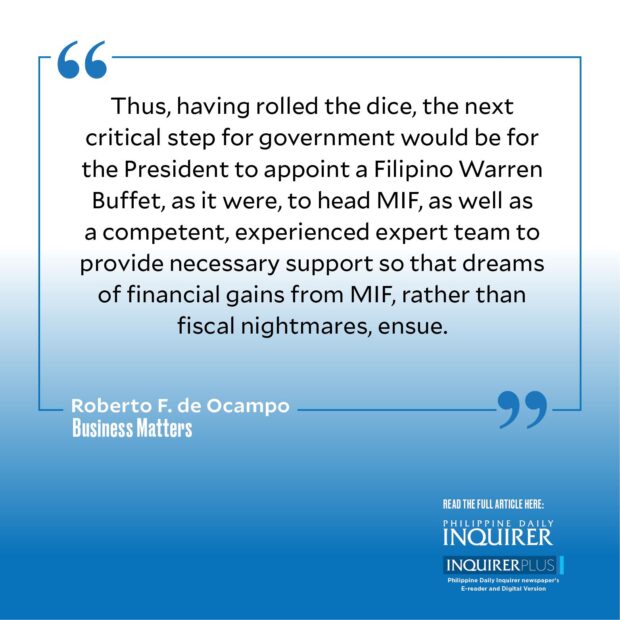Crossroads

The first year of President Marcos has been one bracketed by an impressive electoral victory and a continuing high approval rating that has hovered between the mid-60s and mid-70s. In between, the economy has experienced healthy gross domestic product (GDP) growth ending 2022 at a high of 7 percent and moderating to 6.4 percent after the first quarter of this year. There have been stumbles along the way such as the sugar importation brouhaha and the rapid change of executive secretary but nothing that unusual compared with the first year experiences of previous presidents.
It would seem that the pluses have outweighed the minuses so far and the private sector’s wait-and-see posture is leaning more toward a qualified but positive assessment. After all, Cabinet appointments, particularly of the economic team and more recently the defense and health portfolios, plus positive moves on public private partnerships and the full opening of renewable energy projects to foreign investments have improved confidence in the administration. Having said that, things will surely be more challenging for the President and his team going forward. The pent-up demand after the lifting of severe COVID-19 restrictions largely accounted for the high 2022 GDP economic growth, but its effect, as observed by the decreasing pace of economic growth, is waning, although the World Bank still projects a 6-percent GDP growth for 2023. Furthermore, the tectonic shifts resulting in an evolving reordering of the world economy and the geopolitical relations involved therein, including continuing high inflation and recession, particularly in leading Western economies, the movement away from a United States dominated unipolar global order toward a multipolar one as evidenced by the increasing growth momentum of BRICS (Brazil, Russia, India, China, and South Africa) membership, the beginnings of so-called de-dollarization beginning with the acceptance of payment for oil imports in other currencies than the US dollar, the recent cuts in oil production by the Organization of the Petroleum Exporting Countries that could cascade toward higher oil prices, disruptions in food and supply chains resulting from the continuing Ukraine war, will require exceptionally alert fiscal and monetary management and adept foreign policy formulation.
Regarding the latter, the President’s policy statement that the Philippines will be a “friend to all and enemy to none” must be adhered to and implemented wisely via a clear-headed idea of what constitutes our country’s (not any other’s—including allies’) national interest in a multipolar world presently transitioning through intense, even dangerous, superpower competition. India’s handling of this juggling act could be a model to observe and emulate. As for the former, domestic economic discourse seems almost obsessed by the administration’s legacy initiative — the Maharlika Investment Fund (MIF). After extended gnashing of teeth and rending of garments all around, the MIF is at a crossroads. That crossroads, however, is not a go or no-go one as some continue to propound but whether the final version of the MIF bill would adhere more to the latest (Senate) version or the House one. While I am on record as initially describing MIF as “a good idea whose time has not yet come,” I would hope, at this point, that the final version that would be signed into law would adhere more toward the Senate version which prohibits funding from the Social Security System and the Government Service Insurance System, caps Bangko Sentral ng Pilipinas dividend contribution at P50 billion, deletes government guarantees for MIF bonds, removes various tax exemptions, and allows private parties and multilateral institutions to invest. My main caveat on the Senate version is Article VIII which creates a “joint congressional oversight committee” to review MIF investments “whether planned or under negotiation.” That could be a recipe for potential investment decision-making chaos.
Nevertheless, managing MIF or any investment decision-making process for that matter is an exercise in calculated risk management. Thus, having rolled the dice, the next critical step for the government would be for the President to appoint a Filipino Warren Buffett, as it were, to head MIF, as well as a competent, experienced expert team to provide necessary support so that dreams of financial gains from MIF, rather than fiscal nightmares, ensue.
* * *
Roberto F. de Ocampo, OBE is a former finance secretary and was Finance Minister of the Year, 1995, 1996, and 1997.
Business Matters is a project of the Makati Business Club (makatibusinessclub@mbc.com.ph).




















